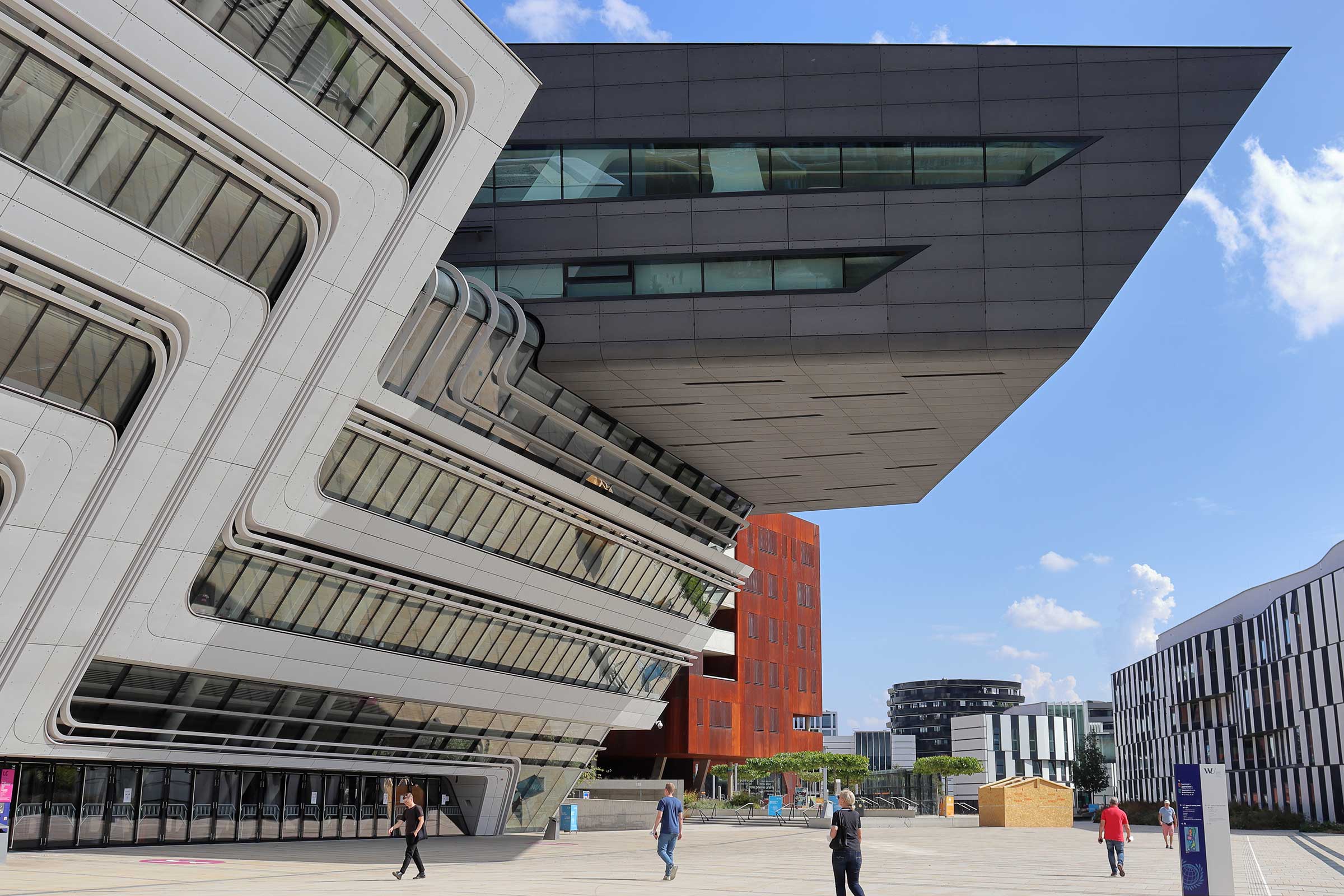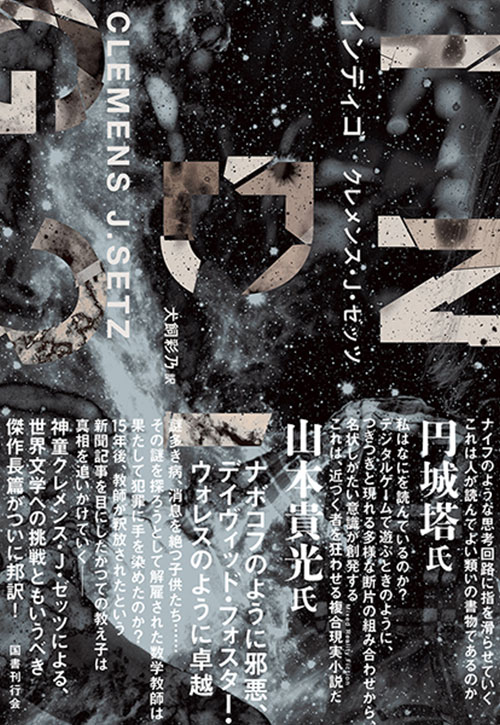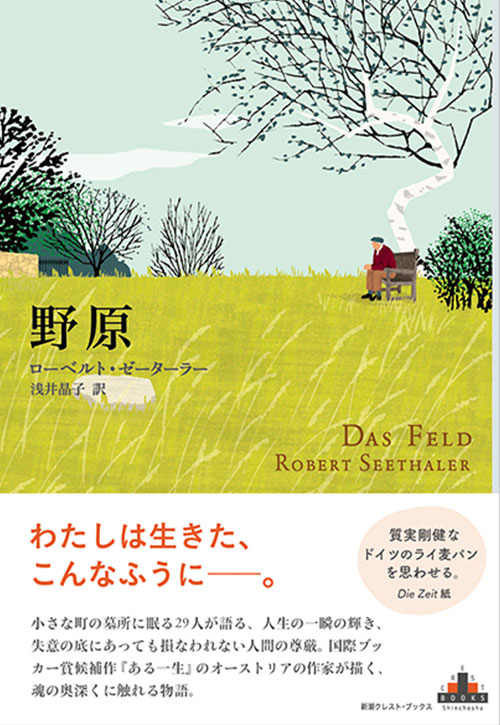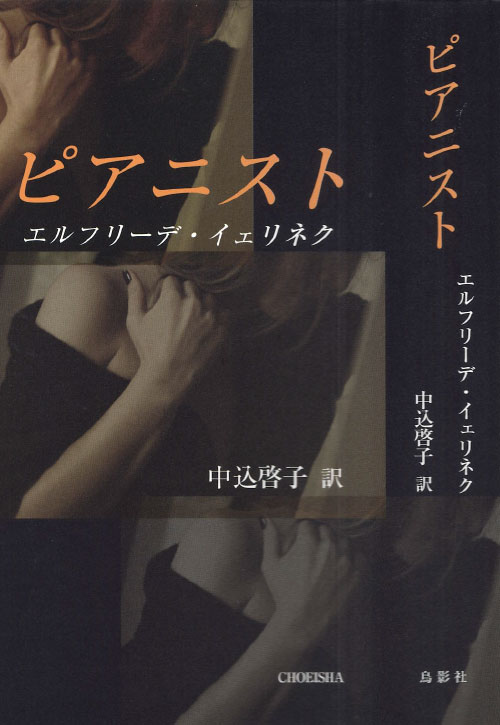
Vienna, Austria, University of Business and Economics library and learning centre, exterior
Milena-Michiko Flašar is an Austrian-Japanese author, who writes about Japanese social phenomenona, such as hikkikomori or kodokushi in German language. In the interview, she traces her life between the two cultures from her childhood days to the present.
Rund um die Burg is a two-day Viennese literature festival that has been held annually in May since 1992. The concept consists of a nonstop reading. At half-hour intervals, different authors take turns to read from their works, without interruption for 24 hours. The event is free of charge and usually takes place in a large tent between the Burgtheater and Café Landtmann and in other adjacent locations.
The Salzburg Literature Festival has been taking place since 2008. During five days in May, literature enthusiasts can encounter literature in all its forms of expression in a wide variety of places across Salzburg. In readings from novels, as well as discussions about non-fiction and cross-referencing with poetry and music, artists and audiences come together for an exchange.
Buch Wien has been held in Vienna since 1948 and takes place at the Vienna Exhibition grounds in November since 2008. It is considered one of the most important events in the Austrian publishing industry and includes numerous stage discussions, panel discussions and lectures by over 500 German-speaking and international authors and experts from several fields, such as politics, culture, science and business.
Austria’s largest literature festival takes place for one week in October and is centered around the country’s libraries. More than 300 events can be attended, including readings, literature walks, book flea markets, literary cafés and even escape rooms. There will also be the opportunity to participate in workshops and to learn how to read ancient writings, as well as exclusive behind-the-scenes looks at the country’s largest library during daily guided tours. The events will take place at various locations throughout the country.
The International Literature Festival, opened in 2004, is organized by the International Erich Fried Society and the Literaturhaus Wien (House of Literature Vienna). Every year in March, authors from Europe, overseas and Austria meet in Vienna to discuss socio-politically relevant topics in readings, lectures and talks. All forms of literature are welcome, from comics to poetry. Inspired by Erich Fried, a political poet, the festival addresses contemporary issues and motivates cross-border exchange.
The Grand Austrian State Prize is the highest award given by the Republic of Austria to an artist for a life’s work that is particularly outstanding in artistic terms. Each year, the Austrian Arts Senate, which consists of 21 members, nominates an artistic personality from the fields of architecture, visual arts, literature or music for the State Prize without a fixed rotation principle. The prize has been awarded since 1950 and is currently endowed with 30.000 EUR.
The literary competition in Klagenfurt was launched in the mid-1970s and is modeled on the discussions of the “Gruppe 47”. The main prize was named after the Klagenfurt author Ingeborg Bachmann
The Austrian Book Prize is organized by the Federal Ministry of Arts, Culture, Public Service and Sports, in cooperation with the Main Association of Austrian Book Trade and the Arbeitskammer Wien (Vienna Chamber of Labor). The aim of the competition is to honor the quality and independence of Austrian literature. The prize includes various awards. Firstly, the best German-language bellestristic, essayistic, lyrical or dramatic work by an Austrian author is chosen, followed by the best debuts and shortlisted works. The prize is endowed with a total of 45,000 EUR.
The Austrian State Prize for Literary Translation is awarded annually by the Federal Ministry of Arts, Culture, Civil Service and Sports. The award honors special achievements in the field of literary translation. It is awarded annually in two categories: as a state prize for the translation of Austrian literature into a foreign language and as a state prize for the translation of foreign-language literature into German. The prizes are endowed with 10,000 EUR each and the awards ceremony takes place at the Literaturhaus Wien (House of Literature Vienna).
Since 2008, the H.C. Artmann/Writer-in-Residence program has invited authors to engage with Hans Carl Artmann’s work and to promote their own writing. The program also facilitates networking in Salzburg as a literary location. It is expressly desired, for example, to present one’s own works to the public at a reading, to meet with colleagues and students and to attend events at the House of Literature with free admission.
The City of Vienna awards work and travel grants for literary translators. The scholarships are awarded for projects involving the translation of foreign-language literature into German or into another regional or minority language used in Austria. Potential Scholars must have a personal connection to Vienna. The amount of funding per candidate is calculated in such a way that it contributes to an increase in the quality of the translator’s work.
The responsibility of department IV/5 of the Federal Chancellery includes the promotion of all areas of literature. Several scholarships aim to promote the work on literary projects (prose, poetry, essay) of young authors who already have independent publications. 15 scholarships of 9,000 EUR each are annually awarded. Applicants need to have Austrian citizenship, or their place of residence should be in Austria.
The Austrian Literary Society has made Casa Litterarum available to Austrian authors since 2010. The house is located on an estate in Paliano about 60 km southeast of Rome. Funding for the stay at Casa Litterarum is provided by a travel grant from the Federal Ministry of Arts, Culture, Civil Service and Sports. The Casa Litterarum is available to scholarship holders for one month at a time and is linked to a travel grant from the BMKOES. The author must have at least one publication and the submitted project should justify the residency in Italy.
The Great Literary Scholarships are awarded by the Province of Tyrol every two years for promising literary projects on the recommendation of a jury of experts. The scholarships are endowed with 15,000 EUR each. Authors from the fields of prose and poetry whose biography or literary projects are closely linked to Tyrol are invited to apply. The scholarship’s aim is to give authors the opportunity to focus on the work on a literary project.


